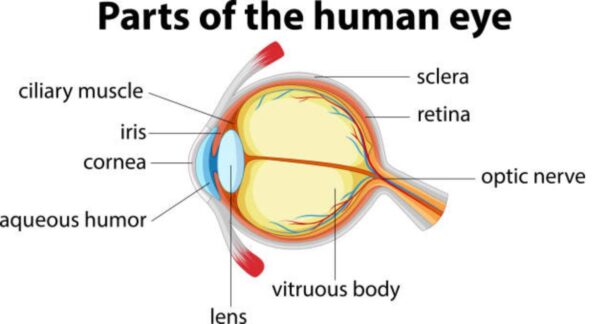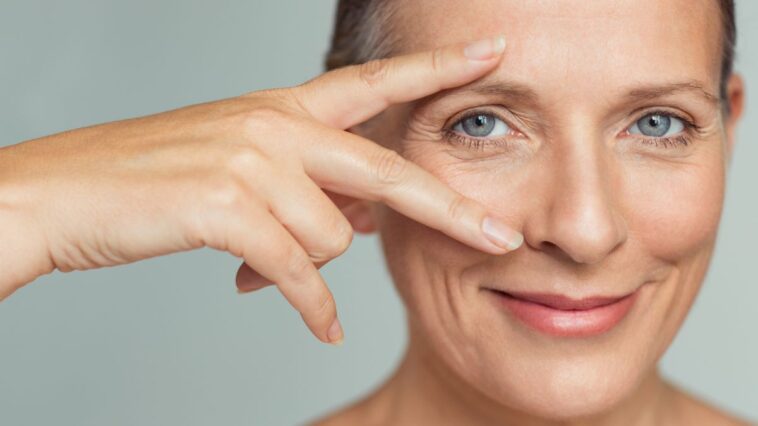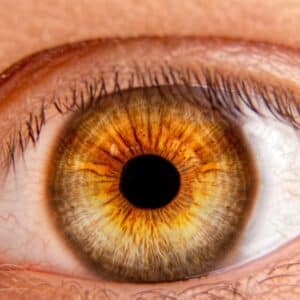What is Aqueous Humor?
Aqueous humor is a clear, watery fluid that fills the eye’s front chamber between the cornea and the lens. It helps to maintain the shape of the eye and also helps to nourish and oxygenate the cornea and lens.
The aqueous humor is produced by the ciliary body and drains away through the trabecular meshwork, located at the angle between the iris and the cornea. Abnormalities in the production or drainage of aqueous humor can lead to conditions such as glaucoma, which can cause damage to the optic nerve and lead to vision loss.

What are the Components of Aqueous Humor?
Aqueous humor is a clear, watery fluid that is composed of several different components, including:
- Water: The main component of aqueous humor is water, which makes up about 98% of the fluid.
- Electrolytes: Aqueous humor contains electrolytes, such as sodium and chloride, which help maintain the fluid’s osmotic balance and regulate the movement of water in and out of the eye.
- Glucose: Aqueous humor also contains small amounts of glucose, which helps provide energy to the eye’s cells.
- Proteins: Aqueous humor contains small amounts of proteins, such as albumin, which help maintain the fluid’s osmotic balance.
- Other substances: Aqueous humor contains other substances such as urea, creatinine, and ascorbic acid.
These components are constantly regulated by the ciliary body and drained through the trabecular meshwork to maintain the ocular pressure and to nourish and oxygenate the cornea and lens.
What is the Function of Aqueous Humour?
Aqueous humor has several essential functions in the eye, including:
- Maintaining the shape of the lens: The aqueous humour helps to keep the lens in its proper shape, which is important for good vision.
- Providing oxygen and nutrients to the cornea: The aqueous humour helps provide the cornea with oxygen and nutrients to keep it healthy.
- Regulating intraocular pressure: Aqueous humour helps to regulate intraocular pressure, which is necessary for keeping the eye healthy and functioning normally.
- Washing out debris: Aqueous humour helps to flush out any debris or foreign particles that may have entered the eye.
- Maintaining proper eye metabolism: Aqueous humour also carries waste products out of the eye and helps to maintain the proper metabolism in the eye.
- Transmitting light: Aqueous humour helps to transmit light to the retina, allowing us to see.
Abnormalities in the production or drainage of aqueous humour can lead to conditions such as glaucoma, which can cause damage to the optic nerve and lead to vision loss.
How Does It Maintain Ocular Pressure?
Aqueous humor helps to maintain ocular pressure by regulating the balance between its production and drainage. The ciliary body, located just behind the iris, produces aqueous humor constantly. The fluid then circulates through the eye’s anterior chamber and drains out through the trabecular meshwork located at the angle between the iris and the cornea.
The rate of aqueous humor production must be balanced with the drainage rate to maintain a stable intraocular pressure (IOP).
If the drainage is blocked or the production is increased, the IOP can rise, which can cause damage to the optic nerve and lead to vision loss.
Conversely, if the production is decreased or the drainage is increased, the IOP can fall, which can also cause problems. This condition is called Glaucoma.
What Diseases Affect Aqueous Humor Production?
Several diseases and conditions can affect the production of aqueous humor and lead to an imbalance in intraocular pressure (IOP). Some examples include:
- Glaucoma: Glaucoma is an eye condition that can cause severe damage to your optic nerve. It happens when the pressure inside your eye increases too much, usually due to a buildup of aqueous humour. Glaucoma can lead to vision loss if left untreated, so it’s crucial to be aware of its symptoms and seek medical help if anything seems amiss.
- Trauma: Trauma to the eye, such as a blunt injury or a penetrating wound, can cause damage to the ciliary body and lead to increased production of aqueous humor.
- Certain medications: Some medications, such as corticosteroids, can increase the production of aqueous humour and lead to higher intraocular pressure .
- Uveitis is an inflammatory condition of the uvea, a middle layer of the eye. It can result in higher-than-normal fluid levels inside the eye, leading to increased intraocular pressure . Symptoms can range from irritation and redness to blurred vision and loss of sight.
- Congenital disorders: Some people may be born with conditions that affect the production of aqueous humour, such as primary congenital glaucoma, a rare inherited condition that can cause increased IOP.
It’s important to note that these diseases can also affect the drainage of aqueous humor, leading to an increase in intraocular pressure, which can cause damage to the optic nerve and lead to vision loss.
How Can I Keep My Eyes Healthy?
Several tips you can do to keep your eyes healthy:
- Regular eye exams: is a crucial part of maintaining your eye health. Whether you have a family history of eye disease or are at risk for certain conditions such as glaucoma or diabetes, visiting the eye doctor can help catch any potential problems early on.
- Wear protective eyewear: Safety eyewear is a must when participating in any activity that could result in an eye injury. Whether playing sports or working with power tools, wear protective eyewear to shield your eyes from potential impacts and debris.
- Eat a healthy diet: Eating a balanced diet is essential for keeping your eyes healthy and strong. Fruits and vegetables high in vitamins A and C, such as spinach, carrots, sweet potatoes, melon, and citrus fruits, can help provide the necessary nutrients for eye health.
- Quitting smoking is one of the best things you can do for your eye health. Smoking increases the risk of developing severe eye conditions, such as cataracts and age-related macular degeneration. If you’ve been smoking, consider making a plan to quit with the help of your doctor as soon as possible.
- Control chronic conditions: It is imperative that those living with chronic conditions, such as high blood pressure, diabetes, or high cholesterol, develop a plan with their doctor to manage such conditions adequately. If left unchecked, these health issues can hurt one’s eye health.
- Limit screen time: Minimizing your exposure to screens is essential for maintaining good mental and physical health. Setting limits on your daily screen time can help you ensure that you get enough rest and engage in other activities away from the computer or phone. Taking breaks from screens every 20 minutes can help reduce eye strain, dry eyes, and headaches.
- Wear UV-blocking sunglasses: Wearing sunglasses that block out UV rays can help reduce the risk of developing cataracts and age-related macular degeneration, both long-term consequences of prolonged exposure to UV radiation. Look for sunglasses with labels indicating 100% UV protection.
Following these steps can help keep your eyes healthy and maintain good vision.
Summary
Aqueous humor is a clear liquid that is an important element required for maintaining the health of your eyes. It fills the anterior and posterior chambers of the eyes and plays an essential role in sustaining its shape, size, and image production functions. The continuous flow of the aqueous humour to these two chambers is essential for proper optical performance.






